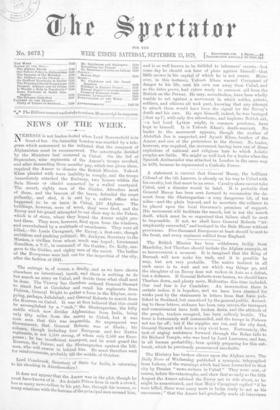It does not appear that the Ameer was in the
plot, though he must have known of it. An Asiatic Prince lives in such a crowd, has so many news-tellers in his pay, has, through his women, so many relations with the harems of the principal men around him, and is so well known to be faithful to informers' secrets—lest some day he should not hear of plots against himself—that little occurs in his capital of which he is not aware. More- over, in this instance, Yakoob Khan warned Cavagnari of danger to his life, sent his own son away from Cabal, and as the dates prove, had riders ready to summon aid from the British on the Peiwar. He may, nevertheless, have been wholly unable to act against a movement in which nobles, priests, soldiers, and citizens all took part, knowing that any attempt to attack them would have been the signal for the Envoy's death and his own. He says himself, indeed, he was besieged [shut up P], with only five attendants, and implores British aid, —a fact Lord Lytton might, in common prudence, have kept to himself. It is Yakoob Khan's death-warrant. No leader to the movement appears, though the mother of Abdullah Jan is suspected, and Ayoub Khan, brother of the Ameer, and one of the pretenders to the throne. No leader, however, was required, the movement having been one of those explosions of national and religious hate to which Asiatic peoples are liable. We might as well look for a leader when the Spanish Ambassador was attacked in London in the same way in 1678, because he represented a Catholic Power.


































